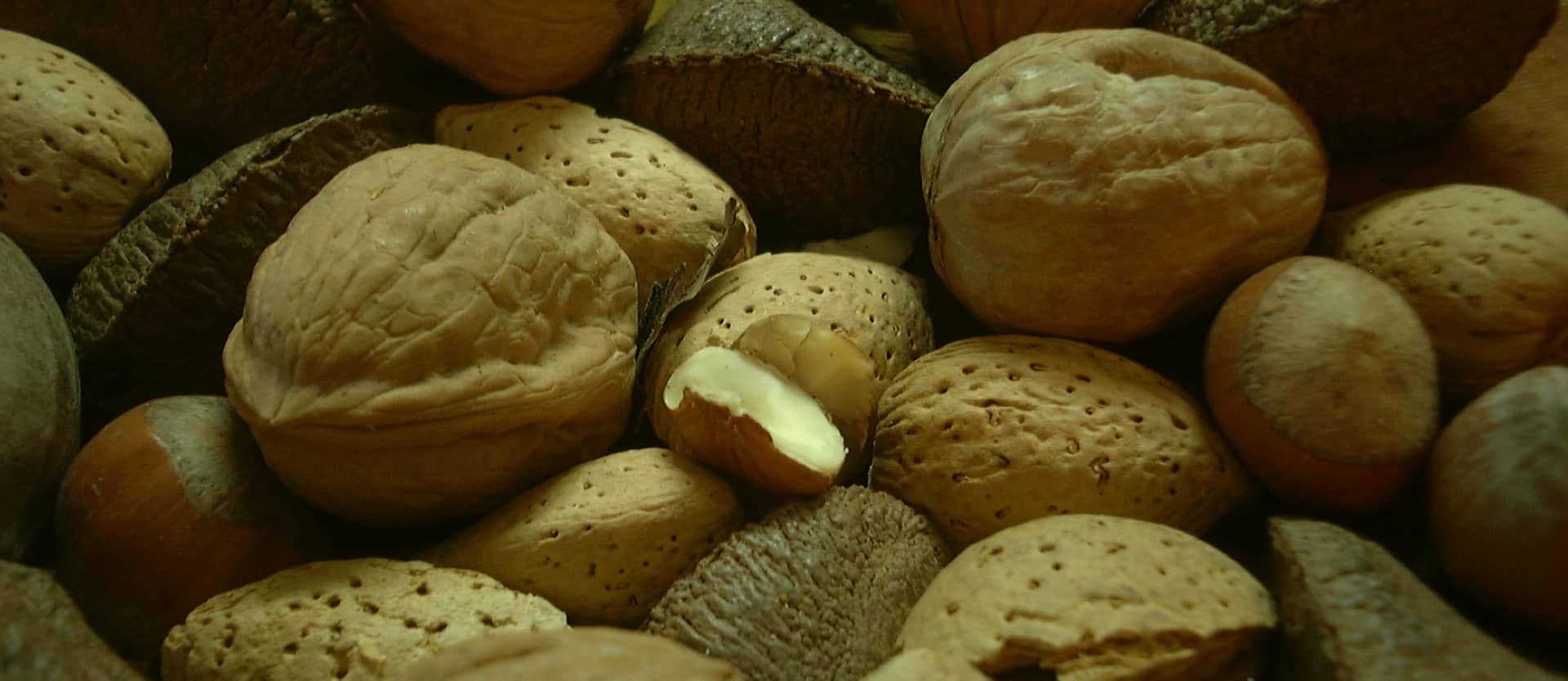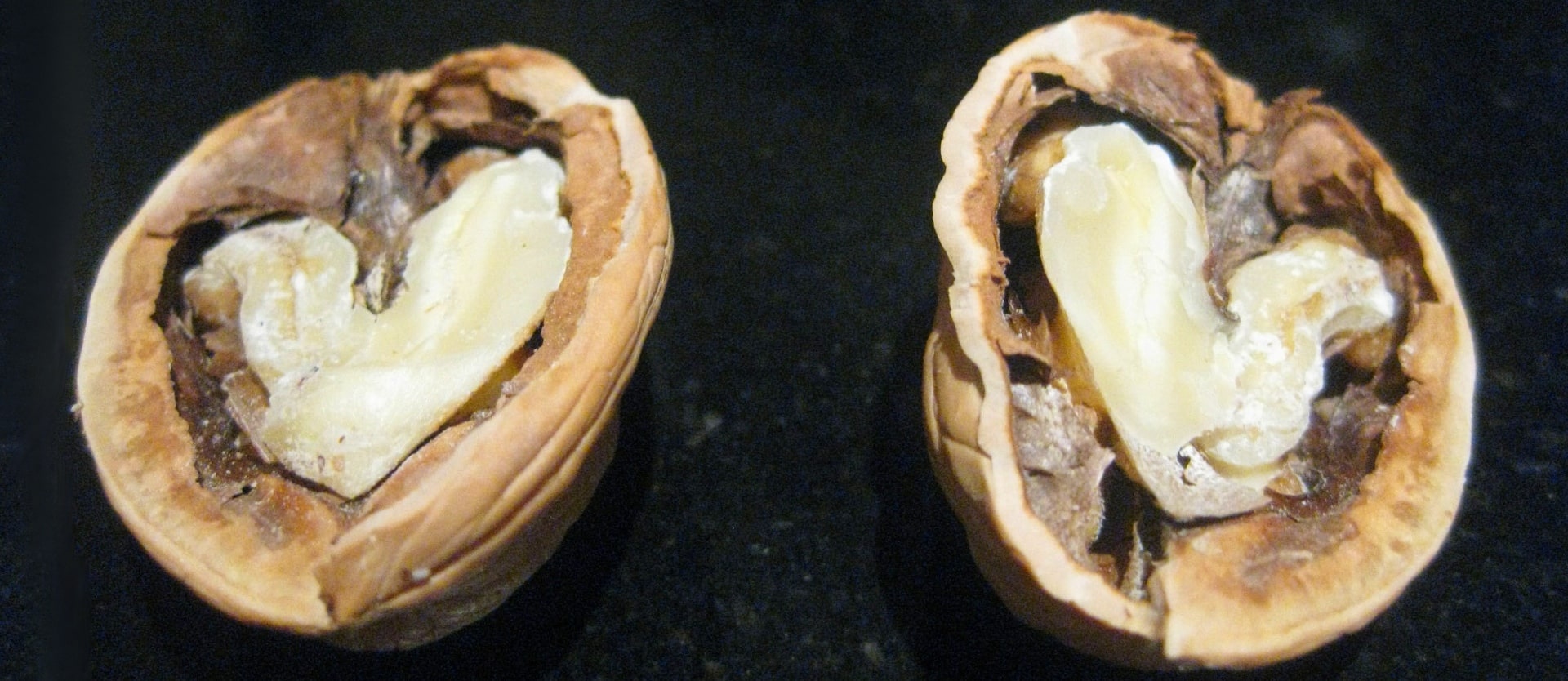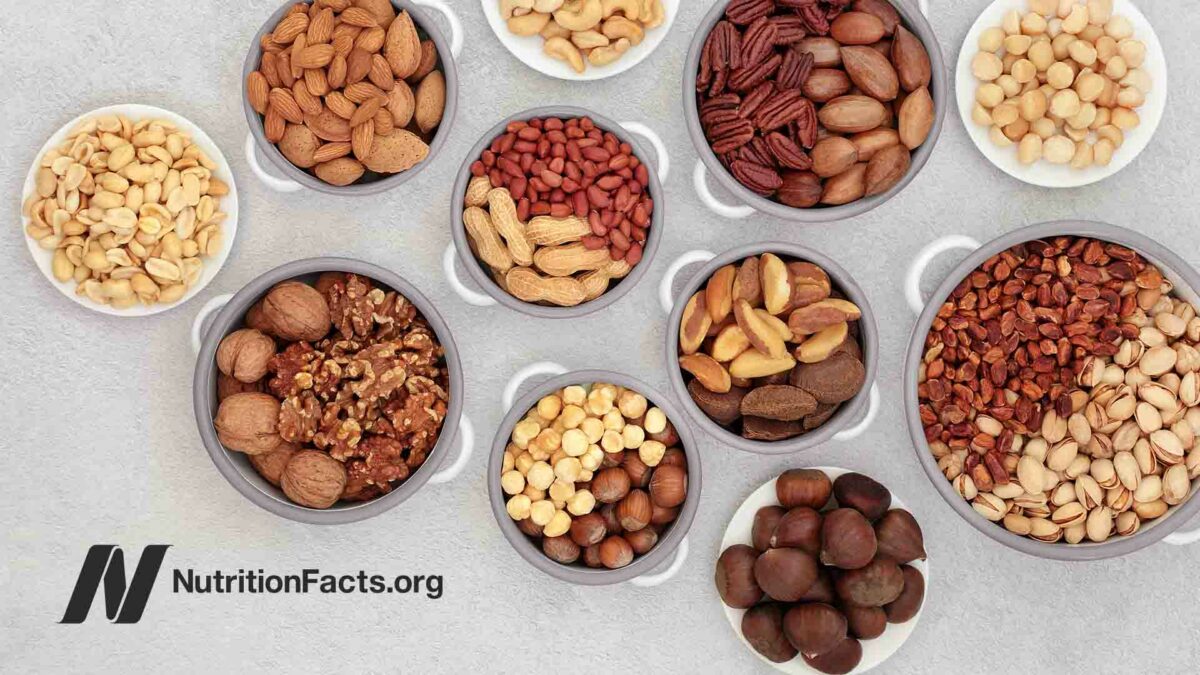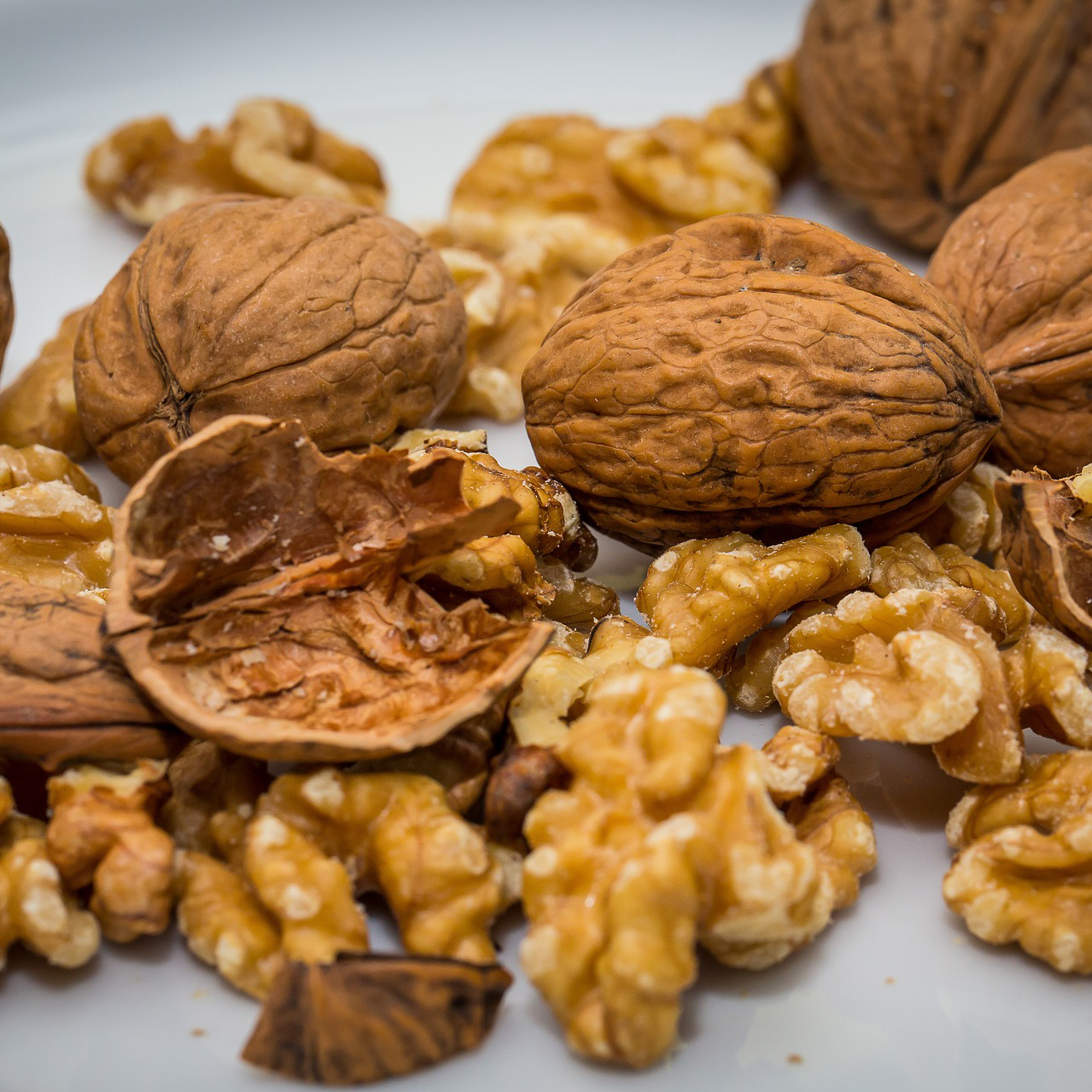
Walnuts
The largest analysis of risk factors for death and disease in history, the Global Burden of Disease Study, calculated that not eating enough nuts and seeds was the third-leading dietary risk factor for death and disability in the world.
Major studies have shown that people who eat nuts appear to suffer fewer deaths from cancer, heart disease, and respiratory disease, and our life span may be increased by an extra two years by eating nuts regularly—one handful (or about a quarter of a cup) five or more days a week.
PREDIMED, one of the largest interventional dietary trials ever performed, followed more than seven thousand men and women at high cardiovascular risk randomized into different diet groups. One group received a free half pound of nuts every week for four consecutive years. Compared with other groups, the added-nuts group appeared to cut their stroke risk in half. And, regardless of which group participants were assigned to, those eating more nuts each day had a significantly lower risk of dying prematurely overall.
In my Daily Dozen, recommend a daily serving of either ¼ cup nuts or seeds, or 2 tablespoons of nut or seed butter.
Which nut is healthiest? Walnuts really seem to take the lead. They have among the highest antioxidant and omega-3 levels, and they beat out other nuts in vitro in suppressing cancer cell growth. And, of all the nuts studied in PREDIMED, the researchers found the greatest benefits associated with walnuts, particularly for preventing cancer deaths.
People who ate more than three servings of walnuts per week appeared to cut their risk of dying from cancer in half. A review of the scientific literature concluded that “the far-reaching positive effects of a plant-based diet that includes walnuts may be the most critical message for the public.”
For substantiation of any statements of fact from the peer-reviewed medical literature, please see the associated videos below.
Image Credit: Maxmann / Pixabay. This image has been modified.
Popular Videos for Walnuts


Which Parts of the Mediterranean Diet Extended Life?
Of all the components of a healthy Mediterranean diet, which are associated with a longer...
Which Nut Fights Cancer Better?
Within hours the blood of those fed walnuts is able to suppress the growth of...
Walnuts and Artery Function
Not eating walnuts may double our risk of dying from heart disease (compared to at...
Mixed Nuts Put to the Test for Erectile Dysfunction
Walnuts, almonds, and hazelnuts are put to the test for erectile and sexual function, sperm...All Videos for Walnuts
-

The Highest Antioxidant: Apple, Bean, Berry, Lentil, or Nut?
The best apple, bean, berry, lentil, and nut are the ones you’ll eat the most of; but if you don’t have a strong preference, which has the highest antioxidant power?
-

Recipe: Lentil–Walnut Burgers with Cheesy Sauce
Our Lentil–Walnut Burgers with Cheesy Sauce are delicious, hearty, and easy to make.
-

3 Healthy, Easy Recipes: Appetizer, Pasta, and Dessert
Celebrate the season with recipes from my cookbooks.
-

Greens, Green Tea, and Nuts Put to the Test for Telomeres
Not all plant foods are linked to less cellular aging based on telomere attrition, and not all animal foods are linked to more.
-

Dietary Approach to Naturally Treating Menopause Symptoms
Specific foods have been shown in randomized controlled trials to improve symptoms like hot flashes.
-

Foods to Help Protect Your Arteries from Saturated Fat
If you’re going to have something unhealthy, is there anything you can eat with it to help mediate the damage it may cause?
-

Mixed Nuts Put to the Test for Erectile Dysfunction
Walnuts, almonds, and hazelnuts are put to the test for erectile and sexual function, sperm count, and semen quality.
-

Pine Mouth Syndrome: Prolonged Bitter Taste from Certain Pine Nuts
Why do some pine nuts cause a bad taste in your mouth that can last for weeks?
-

What Are the Best Foods?
A review of reviews on the health effects of animal foods versus plant foods.
-

Is Butter Really Back? What the Science Says
Is butter—and other saturated fats—bad for you or not?
-

Best Brain Foods: Berries and Nuts Put to the Test
Randomized controlled studies put nuts, berries, and grape juice to the test for cognitive function.
-

The Effects of Avocados on Inflammation
High-fat plant foods—avocados, peanuts, and walnuts—and olive oil are put to the test.
-

Avocados Lower Small Dense LDL Cholesterol
What are the effects of oatmeal, walnuts, extra virgin olive oil, and avocados on LDL cholesterol size?
-

Wakame Seaweed Salad May Lower Blood Pressure
Seaweed salad is put to the test for hypertension.
-

The Downside of Green Smoothies
Concerns about smoothies and oxalic acid, nitrate availability, dental erosion, and weight gain are addressed.
-

Liquid Calories: Do Smoothies Lead to Weight Gain?
If our body doesn’t register liquid calories as well, why are blended soups more satiating than the same ingredients eaten in solid form?
-

Olive Oil and Artery Function
Does extra virgin olive oil have the same adverse effect on arterial function as refined oils and animal fats?
-

Which Parts of the Mediterranean Diet Extended Life?
Of all the components of a healthy Mediterranean diet, which are associated with a longer lifespan?
-

PREDIMED: Does Eating Nuts Prevent Strokes?
A randomized controlled trial found that a Mediterranean-type diet can dramatically lower the risk of subsequent heart attacks. How does it compare with plant-based diet data?
-

The Mediterranean Diet or a Whole Food Plant-Based Diet?
A randomized controlled trial found that a Mediterranean-type diet can dramatically lower the risk of subsequent heart attacks. How does it compare with plant-based diet data?
-

The Role of Diet in Declining Sperm Counts
The ongoing global drop in male fertility may be associated with saturated fat intake and lack of sufficient fruits and vegetables.
-

Which Nut Fights Cancer Better?
Within hours the blood of those fed walnuts is able to suppress the growth of breast cancer cells in a petri dish. Which nut might work best, though—almonds, Brazil nuts, cashews, hazelnuts, macadamias, peanuts, pecans, pine nuts, pistachios, or walnuts?
-

Walnuts and Artery Function
Not eating walnuts may double our risk of dying from heart disease (compared to at least one serving a week)—perhaps because nuts appear to improve endothelial function, allowing our arteries to better relax normally.
-

Nuts May Help Prevent Death
Just a few small servings of nuts a week may increase our lifespan and lower cancer risk.
-

Tart Cherries for Insomnia
The melatonin content in certain plant foods such as almonds, raspberries, and goji berries may explain the improvement in sleep quality associated with tart cherry consumption.
-

Tree Nuts or Peanuts for Breast Cancer Prevention?
Eating fiber-containing foods—especially nuts—during adolescence may significantly lower the risk of developing potentially precancerous fibrocystic breast disease (fibroadenomas).
-

Extra Virgin Olive Oil vs. Nuts
The short-term effect of replacing refined olive oil with extra virgin olive oil, walnuts, or almonds on cardiovascular risk factors.
-

Testing the Fat-Burning Theory
Finally, there’s a solution to the mystery of why nuts don’t seem to make people gain weight. It appears to be a combination of factors—including a boost to our metabolism, which results in us burning more of our own fat stores.
-

Testing the Dietary Compensation Theory
An elegant study is presented, testing the appetite-suppressing effects of walnuts.
-

Black vs. English Walnuts
A dramatic difference exists between the anti-inflammatory and antioxidant effects of black walnuts versus English walnuts.
-

Plant-Based Diets and Cellular Stress Defenses
Measuring the effects of a plant-based diet on the expression of hundreds of different genes at a time, a research group found that an antioxidant-rich portfolio of plant foods such as berries, pomegranates, purple grapes, red cabbage, oregano, and walnuts was able to significantly modify the regulation of genes in the blood of volunteers.
-

Fighting Inflammation in a Nut Shell
The equivalent of eating a single walnut half per day appeared to cut the risk of dying from inflammatory disease about in half, whereas fish did not appear to play a protective role. That may be why those eating vegetarian foods have lower levels of inflammation and chronic disease risk.
-

Anti-Inflammatory Effects of Purple Potatoes
Antioxidant, anti-inflammatory properties of white compared to yellow and purple potatoes. Purple potatoes may also help lower high blood pressure.
-

A Fine Kettle of Fluoxetine
Excreted pharmaceutical drugs, such as Prozac, can end up polluting our waterways, and may bioaccumulate in fish flesh.
-

The Best Nut
Which type of nut has the highest antioxidant content?
